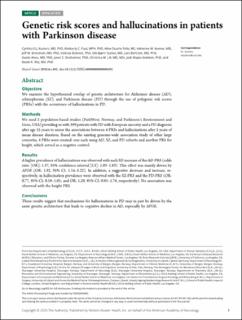Genetic risk scores and hallucinations in patients with Parkinson disease
Kusters, Cynthia D.J.; Paul, Kimberly C.; Folle, Aline Duarte; Keener, Adrienne M.; Bronstein, Jeff M.; Dobricic, Valerija; Tysnes, Ole-Bjørn; Bertram, Lars; Alves, Guido Werner; Sinsheimer, Janet S.; Lill, Christina M.; Maple-Grødem, Jodi; Ritz, Beate R.
Journal article, Peer reviewed
Published version

Åpne
Permanent lenke
https://hdl.handle.net/11250/2754133Utgivelsesdato
2020Metadata
Vis full innførselSamlinger
- Department of Clinical Medicine [2066]
- Registrations from Cristin [9791]
Sammendrag
Objective We examine the hypothesized overlap of genetic architecture for Alzheimer disease (AD), schizophrenia (SZ), and Parkinson disease (PD) through the use of polygenic risk scores (PRSs) with the occurrence of hallucinations in PD.
Methods We used 2 population-based studies (ParkWest, Norway, and Parkinson's Environment and Gene, USA) providing us with 399 patients with PD with European ancestry and a PD diagnosis after age 55 years to assess the associations between 4 PRSs and hallucinations after 5 years of mean disease duration. Based on the existing genome-wide association study of other large consortia, 4 PRSs were created: one each using AD, SZ, and PD cohorts and another PRS for height, which served as a negative control.
Results A higher prevalence of hallucinations was observed with each SD increase of the AD-PRS (odds ratio [OR]: 1.37, 95% confidence interval [CI]: 1.03–1.83). This effect was mainly driven by APOE (OR: 1.92, 95% CI: 1.14–3.22). In addition, a suggestive decrease and increase, respectively, in hallucination prevalence were observed with the SZ-PRS and the PD-PRS (OR: 0.77, 95% CI: 0.59–1.01; and OR: 1.29, 95% CI: 0.95–1.76, respectively). No association was observed with the height PRS.
Conclusions These results suggest that mechanisms for hallucinations in PD may in part be driven by the same genetic architecture that leads to cognitive decline in AD, especially by APOE.
